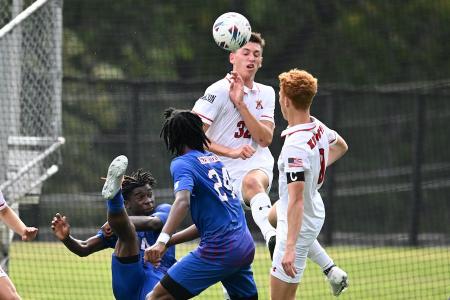Behind the Balance: Drew Menges ’25 — Keydet Soccer
Virginia Military Institute’s cadet-athletes have to juggle cadet life, heavy academic course loads, and their NCAA Division I sport. Committed to both academic and athletic pursuits, balancing their rigorous schedule in both sports and school requires a certain level of commitment and discipline. Behind the Balance is a series that focuses on those cadet-athletes and how they handle the hurdles of the day-to-day.
LEXINGTON, Va. Nov. 21, 2023 — Drew Menges ’25 had dreamed of attending the United States Merchant Marine Academy, but those dreams were halted when he was not admitted due to colorblindness. That didn’t slash his desire to go to military college, though.
“I always wanted to go to a military school … So at the last minute we were looking at other options,” he said.
Menges has a strong desire to serve his country because of his own family’s service. Both his grandfathers served, one in the Navy and one in the Air Force.
“When I found out about military schools, I didn't really know what they did,” he said. “I thought it's pretty cool that you could come here to get a degree and commission.”
When he found Virginia Military Institute, it was nearly kismet. By attending VMI, he’d also be able to play soccer for the school.
“Everything worked out with the coach and then I just applied here and got in,” he said.
When Menges talks about soccer his entire face lights up. You can tell it’s one of his passions. But, he’s serious about it. Starting at the age of 3, he took the field. By the time he entered middle school, he was playing on a club soccer team. There came a time when he had to choose between two sports, though. He was playing both soccer and lacrosse, but they were both during the same season.
Ultimately, soccer scored higher for him.
“I decided to stick with soccer because I liked it more. I think I was a little bit better at it too,” he said.
Scoring goals on and off the field
The mechanical engineering major has a full course load of 18 credits this semester. He’ll also be commissioning into the Army upon graduation. So, his days are tightly packed.
-450x300.jpg) Getting up at 6:30 a.m. daily, he heads to morning training with the soccer team. Morning practices consist of mostly running or stretching. Then, he’s off to formation at 7 a.m. By 7:05 a.m. he’s back to his room to put his hay up, do a little bit of school work, then he attempts to go to Crozet for breakfast before his first class at 9 a.m.
Getting up at 6:30 a.m. daily, he heads to morning training with the soccer team. Morning practices consist of mostly running or stretching. Then, he’s off to formation at 7 a.m. By 7:05 a.m. he’s back to his room to put his hay up, do a little bit of school work, then he attempts to go to Crozet for breakfast before his first class at 9 a.m.
On his long days, he has classes from 9 a.m. to 4 p.m. On good days, he’s out of class by 1 p.m. Practice is at 4:30 p.m. so after class, he’s either rushing to practices or doing work or sleeping.
After practice, he hits up the mess hall, then it’s back to work for the remainder of the night. Sometimes he’s working on class work until midnight. On especially hard nights, he could be up until the wee hours of 4 a.m. completing assignments.
“It's pretty difficult. I'm not going to lie,” he said. “And this year it's definitely ramped up because the mechanical engineering classes have got a lot harder and there's a lot more work. I just try to knock one thing out at a time.”
He suggests doing as much as you can with the time you’re given.
Cadet-athletes at VMI not only have their responsibilities with their selected sport but cadet duties on top of that. There are specific times they can eat, go to class, study, and sleep. They are also required to take physical fitness classes twice a week, participate in ROTC all four years, be prepared for room and uniform inspections, parade preparation, guard duty, and more.
“Before I came here I was not very good with time management. And everything kind of came easy to me, especially with school,” he said. “So coming here, I've definitely learned a lot about what I need to do every day to get stuff done, especially when it's a heavy workload.” 
He also discovered what he’s capable of.
“You're able to find out a lot about what you actually can do,” he said. “Like a regular college or if you didn't come here, you probably would have never found that out by yourselves.”
One tip he does have is to find time for yourself, even if it’s something small. He says he likes to spend some weekends with friends, just hanging out.
“I'm also a very big believer in when I'm doing an assignment and it's not clicking, just taking a break and stepping away from it,” he said. “It really, really helps me. And that's why on the weekends, I always try to find time to do something for myself, instead of just worrying about school and stuff.”
Laura Peters Shapiro
Communications & Marketing
VIRGINIA MILITARY INSTITUTE
.svg)
.png)
